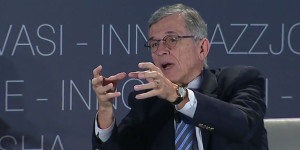It’s all buzzy buzzy out there about Federal Communications Commission Chair Tom Wheeler’s new proposed net neutrality rules, which rest on reclassifying broadband as a utility, thus worthy of Title II telecommunications regulation. Wheeler has a statement posted on Wired. Those who thought he would never do this are happily eating their hats. The telcos are promising more lawsuits. And the big news/blog sites are furiously publishing their numbered lists of ways that the FCC’s initiative will change everything (mind blowingly, of course).
I’m enjoying The Verge’s list the most, which starts with speculation that this Title II initiative could put the damper on “sponsored data” plans. Basically these allow streaming music or other services to pay ISPs for their content not to accrue towards your mobile data limit. Or in the other instances the broadband provider is just picking winners on its own. The most noted of these is T-Mobile’s Music Freedom plan. We’ve written about it with concern. Basically Music Freedom classifies select streamers (Pandora, Spotify) as incognito when it comes to tracking your data ceiling. Thus you don’t have to fret about getting dinged if you listen to them (The Verge calls this a “zero rating” service).
The worrisome question, of course, is how much of an advantage this sort of program will give big streamers over smaller operations, not to mention public, college, and community radio outfits and all those Low Power FM music oriented stations that will run Internet streams soon.
The Verge thinks these new utility rules will make a difference:
“Under the FCC’s proposed new rules, so-called zero-rating services like Music Freedom wouldn’t be outright banned, but they’d be examined on a ‘case-by-case basis, says a senior FCC official. The official notes that Music Freedom is a ‘lesser concern’ for prohibition because there’s no obvious harm to the consumer. Clearly, though, that could change: in order for it to be allowed under Title II, it wouldn’t be able to hinder service to any of T-Mobile’s customers, which suggests that there would be no way for T-Mobile to ever deny a music service entrance into Music Freedom — nor would it be able to charge streaming providers for the privilege of being a part of the program.”
I sure hope the aforementioned is how things play out. But if the FCC doesn’t see these plans as “paid prioritization” schemes (a pointed no-no), I worry that its analysts might vaguely classify them as “rate” schedules, which the Commission promises to forbear regulating. I quote from the agency’s news release:
“Rate regulation: the Order makes clear that broadband providers shall not be subject to tariffs or other form[s] of rate approval, unbundling, or other forms of utility regulation.”
The paid prioritization language published today looks good, though, and relevant to the issue:
“No Paid Prioritization: broadband providers may not favor some lawful Internet traffic over other lawful traffic in exchange for consideration – in other words, no ‘fast lanes.’ This rule also bans ISPs from prioritizing content and services of their affiliates.”
We’ll have to wait for the full Order to get a better sense of where these questions might go. To what extent will the Commission see Music Freedom style services as “hindering” consumers? Will beneficiaries of Music Freedom be understood as “affiliates”? “The Chairman’s comprehensive proposal will be voted on the FCC’s February 26 open meeting,” the press release notes.



